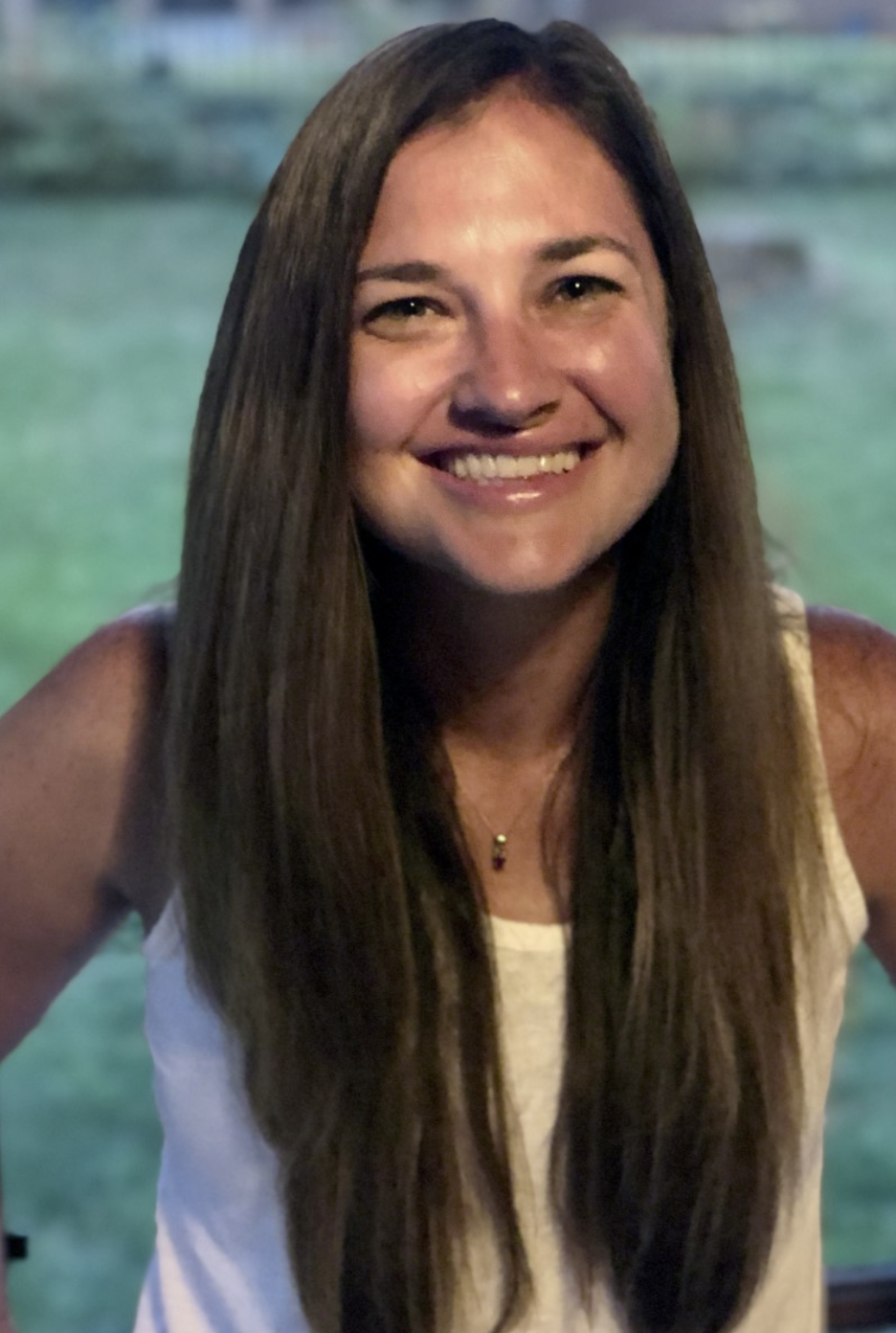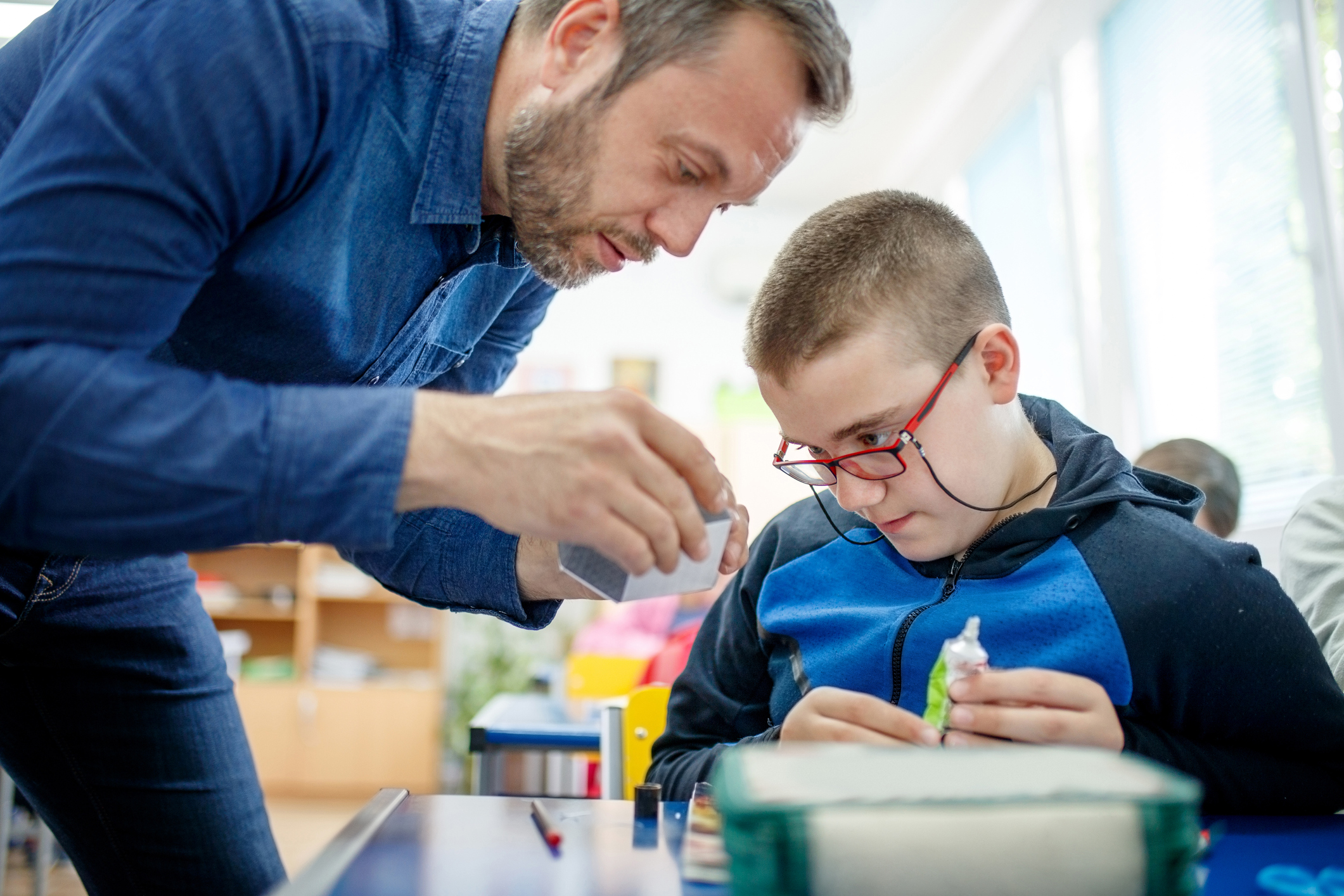Special education teachers work with children and young adults with disabilities in classroom settings. These educators need a bachelor's degree and state license to begin their careers. Once employed, special education teachers may lead classrooms or assist teachers with individual students.
According to the Bureau of Labor Statistics (BLS), special education teachers earned a median salary of $61,420 as of May 2020. The BLS projects that the U.S. will add 14,300 special education jobs from 2019-2029.
What Is a Special Education Teacher?
A special education teacher works with students with mental, emotional, physical, or learning disabilities. These educators can serve in private and public schools, and some help remote learners and homeschooled students. This profession dates to the 1950s when teachers first became trained to work with learners with disabilities.
Today, special education teachers must hold a bachelor's degree or a master's degree, along with state certification or licensure in special education. Some special education teachers have additional training and certification in working with blind, visually impaired, deaf, or hard-of-hearing students.
What a Special Education Teacher Does
Special education teachers equip students with the confidence and skills to progress through schooling and into the larger world. By preparing their students for learning and life, these educators help young people reach their full potential. The benefits of teaching special education include a higher-than-average salary and the emotional rewards of seeing students thrive.
Effective special education teachers are organized, creative, patient, and possess calming natures. These educators must maintain a sharp focus on helping students maximize their potential to achieve, while remaining at ease with frustrated parents and lots of paperwork.
Special education offers many fulfilling opportunities. For example, teachers can concentrate on specific disabilities, such as behavior, autism, or visual or hearing impairment. Some may focus on research, write articles, or mentor new special education teachers. Others professionals advance into educational leadership positions.
Like other career fields, special education has inherent challenges. The disadvantages of being a special education teacher include a lack of peer support, difficulty assisting individuals with different disabilities, and dealing with stressful situations.
Main Responsibilities of Special Education Teachers
- Assess Students' Skills: Assessment plays a key role in special education. Through assessments, teachers can discover each learner's strengths and learning needs. An initial assessment can help determine if a student qualifies for services. Follow-up assessments reveal the most beneficial accommodations and goals for learners.
- Teach and Mentor Students: Some special education teachers provide direct instruction for students in classrooms. Most special educators, however, work with learners in general classrooms, small groups, or one-on-one environments. They may provide support during class activities, offer instruction in subject areas, or assist with implementing behavior management plans.
- Create and Implement Individualized Educational Plans: Special education teachers typically work with other professionals to develop individual education plans (IEPs) for qualifying learners. These plans detail students' goals, required accommodations to meet those goals, and assessments used to measure progress.
- Update Student Plans: After implementing an IEP, the special education teacher must record data and keep up-to-date documentation on an educational technology platform. Teachers typically update goals as students make progress.
- Mentor Classroom Teachers: Special education teachers mentor and coach classroom teachers in best practices for managing students with special needs. In this role, special education instructors may co-teach or help modify the curriculum for individual learners. Seasoned educators sometimes mentor college student teachers.
Nonstandard Duties for Special Education Teachers
- Work With Highly Capable Students: Learners with disabilities who demonstrate exceptional academic ability also benefit from additional support. Special education teachers sometimes manage programs for these high-achieving students. Such programs assist enrollees with their educational, emotional, and social growth.
- Assess Students With Visual Impairments: A teacher of the visually impaired serves students who are blind or who have visual impairments. These teachers research, recommend, and implement curricula and technology that best serve blind or visually impaired learners.
- Identify Strategies for Teaching Hard-of-Hearing Students: Some educators work with students who are deaf or hard of hearing. These teachers may serve in school districts or schools for individuals who are deaf or blind.
- Conduct Homeschooling Consultations: Special education teachers may provide direct support to remote learners by teaching lessons over a virtual educational platform. Some educators also offer private consultations to parents who homeschool their children with disabilities.
- Write for Educational Journals: Special education teachers may conduct research in the field and publish their work in peer-reviewed journals. Often, researchers and writers have earned master's degrees or doctorates in special education.
Life as a Special Education Teacher
While each special education teacher's daily schedule varies, the day usually revolves around serving students and completing required documentation. A typical day in the life of a special education teacher may look like this:
- 7:00 AM: Arrive at school and report to the office for a short staff meeting.
- 8:00 AM: Students arrive in the classroom for instruction.
- 9:00 AM: Co-teach math with a general teacher. Special education instructor assists students with work.
- 10:00 AM: Work on reading fluency and comprehension with small groups of students.
- 11:00 AM: Assist eight special education students with writing. One student uses an augmentative alternative communication device to communicate.
- 12:00 PM: Lunch
- 1:00 PM: Provide support to the physical education teacher.
- 2:00 PM: Help students write down homework and pack up for dismissal.
- 3:00 PM: After-school meeting in the media center with parents, teachers, and school counselors.
- 4:00 PM: A planning period spent writing progress reports for students' IEPs.
- 5:00 PM: Head home.
Professional Spotlight: Interview with a Special Education Teacher

Ashley McCargish
Ashley is a wife, mom of two, and special education teacher. She has a love of teaching, reading, and helping others any way she can. Ashley's passion for helping others and sharing her experiences led to her launching the loveashleye.com blog to help parents feel confident in the skills they teach their children in everyday life.
As a certified intervention specialist, Ashley holds a license in grades K-12 and a certified teaching license in grades preK-5. Ashley is also trained in The Nurtured Heart Approach, Zones of Regulation, and CPI (nonviolent crisis intervention).
Ashley has taught students with behavioral needs for seven years in grades K-5. She has experience teaching kindergarten and first grade and currently works as an intervention specialist with students in grades K-5.
What previous experience(s) did you have in this (or related) field (professionally, as a volunteer, etc.), if any, and what prompted your journey to become a special education teacher?
I can't remember a time when I didn't want to become a teacher. As a young child, I would play "school" at home with my make-believe lists, imaginary friends, and stuffed animals.
It wasn't until I grew older that I learned about the role of a special education teacher. I had a family member that was struggling with learning how to read. Even though I was in middle school, I wanted to learn all I could about how to help this individual become a better reader. It was then that I learned about the importance of special education and the role of an intervention specialist at a school.
When I went to college, there was no doubt in my mind that I wanted to be a teacher for primary education students. While I was there, many of my peers were on track to graduate with dual licenses in both general education and special education. I knew that having both licenses would open up more opportunities for me to work with a variety of different students.
If you specialize in a particular subject or work in a particular industry/sector, what prompted this choice, and/or how did it evolve?
My first year as a teacher, I was assigned to a kindergarten classroom. I loved teaching kindergarten!
However, due to family circumstances, I needed to get closer to home and was offered an intervention specialist position at a different district. During this time, I worked with students with learning disabilities and autism in grades kindergarten through sixth grade. I enjoyed my time working with each of these students. My favorite part was trying to figure out what was going to best help them learn and achieve the goals set for them.
Later in my career, I began working at a learning center. During my time at the learning center, I worked with students that had behavioral needs. I was nervous to take the position, but I'm so thankful that I did! I learned about functional behavior plans, daily behavioral reports, analyzing behavioral data to make strong behavior plans that worked, and I saw students achieving their goals.
I am currently working as a resource room intervention specialist with students in grades kindergarten through third grade. This past school year, I also worked with fourth grade students. I have learned over the years that I love helping all students achieve their goals regardless of their grade level.
For whom do you think this career is a good fit? Why?
I think it takes someone that has compassion, empathy, flexibility, and a strong desire to help others to be a great special education teacher. My job as a special education teacher requires me to be able to collaborate with a variety of different team members. It's important to be able to develop relationships with the student, parent, school psychologist, classroom teachers, related service team (speech, occupational therapy, physical therapy, etc.), and administrators.
Special education teachers are kind of like detectives — they have to work with the team to figure out what is making learning challenging for students. Then they have to help build connections to help the student learn to be successful.
What educational path did you take to become a special education teacher? Did you pursue additional education at any point? What was your educational experience like?
To become a teacher, I went to college for my bachelor's in education. I then went on to get my teaching license for the state of Indiana, where I went to college. After that, I worked on getting my license in the state of Ohio, where I knew I ultimately wanted to teach. I currently keep up on my license through professional development opportunities through my district.
What certifications or tests did you need to pass, if any, to enter the field and/or progress in your career?
Teachers are required to take a Praxis test during college. I took three tests during my time in college, and I took some after I graduated for my licensure. In my experience, different states have different requirements. Check with your state department's license application. You may also need to check with your college advisor.
How did you prepare for them?
I was offered study guides and practice assessments through my university.
What were they like?
They were multiple-choice questions that reminded me of the ACT that I took in high school. It was a standardized test.
What's a typical day like for you?
A typical day for me is difficult to put into words because it can vary based on my students' needs for the day. Each of the students on my caseload has their own individualized plan that states how they will receive their services from me.
With this in mind, along with the daily classroom and related service schedule, I'm able to meet the minutes in the plan. To do this, I may be in the general classroom setting, holding small group lessons in my resource room, or meeting a child in a one-on-one setting.
Last year, my days started by supporting students in their classroom through their morning routine. I then began to work with third grade students in a small group or one-on-one setting to meet their minutes in a particular subject area. After that, I went to first grade and worked with students in their classroom or pulled them to work with them one-on-one on skills specified in their IEP.
After that, I began working with students on reading skills during small group reading time. I worked with students in grades 1-4, so I had a group for each grade level. Then I worked with fourth grade on math skills, and I ended my days by working with second grade in math.
What's your favorite part of being a special education teacher?
My favorite part of being a special education teacher is seeing students meet their goals! I love it when they learn something new or begin to understand concepts that they have struggled with in the past.
I also love getting to build relationships with my students. I typically get to work with the same students for a few years, and that brings me a lot of joy. I get to see growth from them over a number of years.
The most challenging part?
Special education teachers face a lot of challenges. One of the challenges I have heard mentioned over the years is working with a variety of different grade levels, standards, and abilities makes the job require a lot of flexibility. Special education teachers can be pulled to handle a lot of different situations during the day. This can make it hard to keep track of your ultimate goals for each child.
Another challenge can be to have the whole team on the same page as to what is best for the child. When building an IEP, the team can consist of up to 10 people at times. It can be challenging when there are different perspectives on what will help the child be most successful. Ultimately, when keeping the child's strengths, challenges, learning style, and other factors in mind, a plan can be developed to help the child succeed.
What advice do you have for individuals considering becoming a special education teacher?
My advice to individuals considering becoming a special education teacher would be to get into classrooms and resource rooms of special education teachers in your area. You can learn a lot from observing and being involved in different types of special education settings. If you aren't sure how to get in touch with a special education teacher to observe or learn more about their role in a school, check with your advisor at your university or call a local principal to let them know you are considering it. They may have options available for you.
I would advise them to ask questions and be open-minded to trying new ideas. You never know what could be the key to a student's success.
What do you wish you'd known before becoming a special education teacher?
I wish I had known that becoming a special education teacher, although it brings challenges, also brings me so much joy! I truly love my career path and seeing the kids grow, succeed, and overcome challenges.
Where Special Education Teachers Work
Special education teachers work all over the U.S. and in international schools around the world. According to the BLS, states with large populations, like New York, California, and Texas, hire the most special education teachers. Most jobs cluster in urban areas with high numbers of students. Nonmetro areas with large special education teacher populations include southwest Louisiana, southern Maine, and eastern Kentucky.
Large cities like NYC, Atlanta, and Washington, D.C., offer the most special education opportunities. Metro areas and coastal states offer some of the top-paying special education jobs. The lowest-paying positions tend to appear in central and midwestern states.
While relocating for a more lucrative position might seem like a good idea, a higher cost of living can offset the benefits of higher pay. In addition, moving for a career can impact family life, social connections, and even career benefits. Most of the time, location does not affect a special education teacher's job duties.
While K-12 schools offer the most special education positions, some teachers work in hospitals, residential facilities, or students' homes. Educators with master's degrees or higher in special education may teach aspiring teachers in a college or university setting. Graduate education can also prepare teachers for work in research, public policy, or special education administration.
Regardless of location, this career may incorporate short-term travel to seminars and conferences.
Should You Become a Special Education Teacher?
The need for special education teachers continues to grow. People who love teaching children, can cope with volumes of paperwork, and enjoy advocacy as much as education can flourish in this field.
Working as a special education teacher still comes with a unique set of challenges. These educators often face stressful situations with students who live with emotional or behavioral disabilities. They may also work with various grade levels and standards, plus struggle to secure resources.
For the right individuals, this field offers many enticing benefits. According to the BLS, special education teachers earn a median salary of $61,420 per year as of May 2020, slightly more than elementary school teachers. Experienced special education teachers who earn master's degrees can go on to become intervention specialists or directors of special education. Earning a doctorate in the field can lead to postsecondary teaching jobs and research opportunities.
How to Prepare for a Career as a Special Education Teacher
Becoming a special education teacher starts with earning a state-approved bachelor's degree or master's degree in special education. Only a few schools offer initial licensure programs online, so distance learners may need to find institutions located near their homes.
At some schools, students can major in general or special education. Other institutions allow enrollees to focus on specific areas, such as multiple disabilities, severe disabilities, or autism spectrum disorders. After graduation, students must complete a teaching preparation program, which includes student teaching experiences in special education classrooms.
States require aspiring special education teachers to take a certification exam. This test covers general and special education content. Students can find online resources to help them prepare. After passing their exams, teachers can apply for state licensure and begin their job search.
Learn More About Special Education Teachers

What Is a Special Education Teacher?
Discover special education teachers' daily responsibilities with this guide. This page describes the role these professionals play in instructional teams in K-12 environments.

How to Become a Special Education Teacher
Learn about the steps to become a special education teacher, including the education, experience, and licensure required to join the field.

Salary and Career Outlook for Special Education Teachers
Find out how much special education teachers get paid, what influences their salaries, and what the future professional landscape looks like.
Frequently Asked Questions
Special education teachers enjoy fulfilling careers, helping learners develop personal and academic skills for their futures. These educators can build rewarding relationships with their students.
Because they often work with students with behavioral or emotional disabilities, special education teachers may experience stressful situations. In addition, teachers must handle frustrated learners, educators, and parents.
Special education teachers assist students in classrooms, small groups, and individual settings. These professionals also document their work, meet with other educators, and communicate with students and parents.
Special education teachers assess students and develop individualized education plans for each learner. Teachers also use various strategies for students with disabilities, including thematic instruction, small-group learning, and learning centers.
